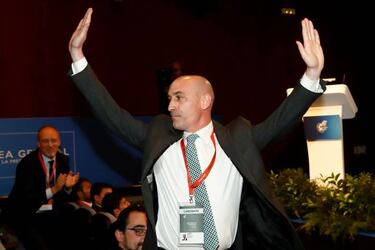Luis Rubiales: Spanish football finally has new president
The Spanish Football Federation (RFEF) finally has a new president: Luis Rubiales. A Canary Islander by birth but raised in Andalusia...
Related stories
The Spanish Football Federation finally has a new president: Luis Rubiales. A Canary Islander by birth but raised in Andalusia, Rubiales is an ex-player who came to prominence during a crisis at Levante, where, as club captain, he led a strike over the delayed payment of wages - one that almost caused the postponement of the Granotas' visit to the Bernabéu. He's a tenacious guy who studied law while still a footballer and, following his retirement, reached the role of president of the Afe, Spain's players' union, which he headed up well, despite also attracting his fair share of critics. His hardline approach to negotiations earned him the enmity of LaLiga boss Javier Tebas, who backed his opponent, Juan Luis Larrea, in these elections.
Some surprised by margin of Rubiales' victory
Rubiales won by 80 votes to 56, with one blank ballot and two abstentions. 80 votes from 139 assembly members: that's a fairly clear majority. Some have been surprised by it. It was thought that, among a group of electors that is the same one that backed former chief Ángel María Villar, Larrea would have more supporters. After all, he had worked with him longer than anyone and was named his interim successor for that very reason. I get the impression Rubiales was the more active of the two during the campaign, and that Larrea's standing among his former brethren was not aided by the support of Tebas, who over the past few years has been a sworn enemy of the RFEF; indeed, many asambleístas have pretty much viewed him as the devil.

New RFEF president will have his work cut out...
Rubiales will have his work cut out in his new job, that's for sure. I wouldn't go as far as to say that the Federation has been a disaster, but it has for many, many years been run in a rather unique fashion thanks to a somewhat eccentric style of leadership under Villar, let's just say. Changing the organisation's ways won't be an easy task by any means, particularly given that these presidential elections only cover the period running until the end of 2020, i.e. the time remaining in Villar's final term in charge. At that point we'll have to do all this again. Before then, though, Rubiales should have enough time to get a good few things of note done; his prospects of renewing his mandate in two years will depend on that.
